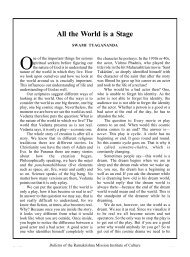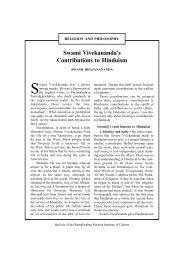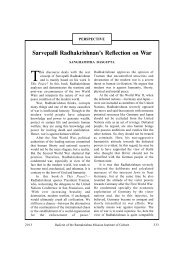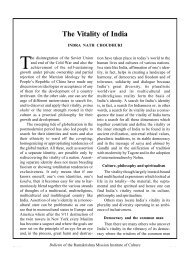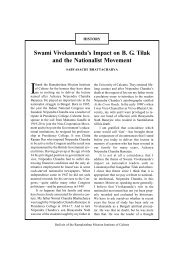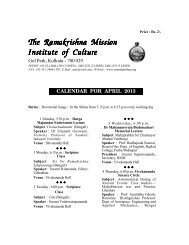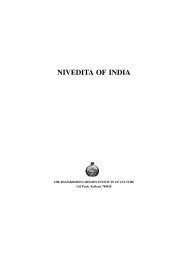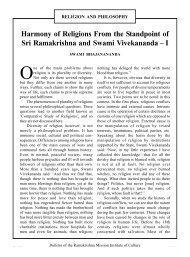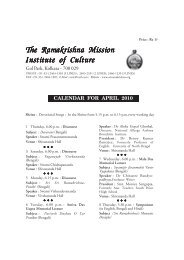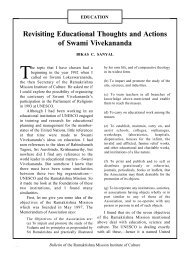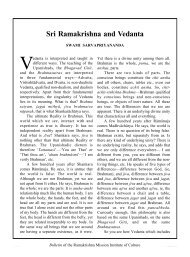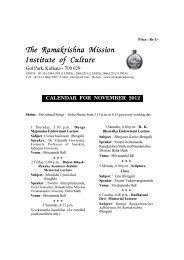Dharma in Modern Context - Ramakrishna Mission Institute of Culture
Dharma in Modern Context - Ramakrishna Mission Institute of Culture
Dharma in Modern Context - Ramakrishna Mission Institute of Culture
You also want an ePaper? Increase the reach of your titles
YUMPU automatically turns print PDFs into web optimized ePapers that Google loves.
DHARMA IN MODERN CONTEXT<br />
RELIGION AND PHILOSOPHY<br />
<strong>Dharma</strong> <strong>in</strong> <strong>Modern</strong> <strong>Context</strong><br />
PRAVRAJIKA ATMADEEPAPRANA<br />
India from time immemorial has been<br />
the holy land where all that is good and<br />
noble has found a home. The<br />
cultivation <strong>of</strong> values has been as necessary<br />
to the H<strong>in</strong>dus as air and water are for<br />
liv<strong>in</strong>g. From the very birth, nay even<br />
before birth, a H<strong>in</strong>du is nurtured <strong>in</strong> a<br />
healthy environment where values are<br />
emphasized.<br />
India’s greatest gift to the world are<br />
the four Vedas. Vedas mean ‘Knowledge’.<br />
Also called the ‘Shrutis’, they are the<br />
lifel<strong>in</strong>e <strong>of</strong> Indian culture. Indian society<br />
operates on the guidel<strong>in</strong>es laid out by the<br />
Shrutis and Smritis. The latter were meant<br />
to convey the highest pr<strong>in</strong>ciples mentioned<br />
<strong>in</strong> the Shrutis to all <strong>in</strong> a sugar-coated form<br />
through stories, narratives, etc, and<br />
prescribe a code <strong>of</strong> conduct.<br />
Our scriptures declare that there are<br />
four purushàrthas or goals <strong>in</strong> life <strong>of</strong> an<br />
<strong>in</strong>dividual. They are—<strong>Dharma</strong>, Artha,<br />
Kàma and Moksha—morality/virtue,<br />
wealth, enjoyment and liberation. The<br />
H<strong>in</strong>du’s life accord<strong>in</strong>gly is also divided<br />
<strong>in</strong>to four categories—brahmacharya,<br />
gàrhastya, vànaprastha and sannyàsa,<br />
studentship, household life, retirement from<br />
worldly life, and renunciation.<br />
It is <strong>in</strong>terest<strong>in</strong>g to note that <strong>Dharma</strong><br />
occupies the first and foremost place <strong>in</strong> the<br />
H<strong>in</strong>du’s scheme <strong>of</strong> life. Not only is it <strong>in</strong><br />
the forefront, it is the heartbeat <strong>of</strong> all other<br />
àshramas too. In fact, even <strong>in</strong> the<br />
Sannyàsa âshrama, where the renunciant is<br />
freed from all temporal obligations, the<br />
necessity <strong>of</strong> <strong>Dharma</strong> is never underm<strong>in</strong>ed.<br />
Sri Krishna asserts it <strong>in</strong> the Gità, ‘Na<br />
budhhibhedam janayet ajnànàm<br />
karmasang<strong>in</strong>àm/Joshayet sarva-karmàni<br />
vidvàn yuktah samàcaran.’ The enlightened<br />
man should not create confusion <strong>in</strong> the<br />
m<strong>in</strong>ds <strong>of</strong> ignorant people (by his conduct).<br />
Himself work<strong>in</strong>g with equanimity, he<br />
should make them <strong>in</strong>terested <strong>in</strong> all<br />
activities. The wise man thus never<br />
disregards <strong>Dharma</strong>, for the mass always<br />
follow his footsteps. Sri <strong>Ramakrishna</strong> puts<br />
it beautifully <strong>in</strong> his simple language: The<br />
expert s<strong>in</strong>ger never s<strong>in</strong>gs a false note.<br />
Similarly the man who has realized God<br />
never takes a wrong step. 2 Lord Krishna<br />
says <strong>in</strong> the Gità, ‘If I do not work and set<br />
an example, the three worlds would have<br />
perished follow<strong>in</strong>g My footsteps.’ 3<br />
Concept <strong>of</strong> ritam<br />
The whole universe is governed by a<br />
div<strong>in</strong>e code. Even the gods <strong>in</strong> heaven and<br />
nature herself do not dare deviate from this<br />
rule. The sun, moon, stars, the heavenly<br />
bodies—all follow a law. This eternal law<br />
is termed ritam <strong>in</strong> the Vedas. The Katha<br />
Upanishad says, ‘Bhayàdasyàgnistapati<br />
bhayàttapati suryah; Bhayàd<strong>in</strong>drascha<br />
vàyuscha mrityurdhàvati panchamah.’<br />
‘—Out <strong>of</strong> fear <strong>of</strong> Him the fire burns and<br />
the sun sh<strong>in</strong>es. So do Indra, Vàyu and<br />
even the <strong>in</strong>v<strong>in</strong>cible death, the fifth.’ 4<br />
The div<strong>in</strong>e power <strong>in</strong>carnates aga<strong>in</strong> and<br />
aga<strong>in</strong> whenever this <strong>Dharma</strong> tends to<br />
decay. He then shows the proper way by<br />
practis<strong>in</strong>g these pr<strong>in</strong>ciples <strong>in</strong> His own life.<br />
Sri Krishna says, ‘Yadà yadà hi dharmasya<br />
2012 Bullet<strong>in</strong> <strong>of</strong> the <strong>Ramakrishna</strong> <strong>Mission</strong> <strong>Institute</strong> <strong>of</strong> <strong>Culture</strong><br />
493
PRAVRAJIKA ATMADEEPAPRANA<br />
glànirbhavati bhàrata/Abhyutthànam<br />
adharmasya tadàtmànam srijàmyaham./<br />
Paritrànàya sàdhunàm v<strong>in</strong>àshàya cha<br />
dushkritàm/<strong>Dharma</strong>samsthàpanàrthàya<br />
sambhavàmi yuge yuge.’—‘Whenever there<br />
is a decl<strong>in</strong>e <strong>of</strong> virtue and <strong>in</strong>crease <strong>of</strong> vice,<br />
I <strong>in</strong>carnate to re-establish virtue to protect<br />
the virtuous and to destroy the wicked.’ 5<br />
There is a proverb <strong>in</strong> Bengali, ‘âpani<br />
àchari dharma porere shikhào’. It means,<br />
teach others through your own conduct.<br />
Indeed, <strong>Dharma</strong> is one that can be taught<br />
only through practice. ‘The secret <strong>of</strong><br />
Religion lies not <strong>in</strong> theories but <strong>in</strong> practice.<br />
To be good and to do good—that is<br />
the whole <strong>of</strong> religion’ 6 , said Swami<br />
Vivekananda. An ounce <strong>of</strong> practice<br />
is better than hav<strong>in</strong>g by heart a whole<br />
library, he added.<br />
‘Dhàrayati iti dharma’—‘<strong>Dharma</strong> is<br />
that which holds a person’. The earth holds<br />
a man firmly, helps him to be sure-footed.<br />
So is the man established <strong>in</strong> <strong>Dharma</strong> surefooted.<br />
He never falters or falls down.<br />
<strong>Dharma</strong> should be someth<strong>in</strong>g which helps<br />
one <strong>in</strong> this world. The aim <strong>of</strong> <strong>Dharma</strong><br />
should be to br<strong>in</strong>g peace to man. Our<br />
scriptures are <strong>of</strong> the op<strong>in</strong>ion that it is not a<br />
wise th<strong>in</strong>g for one to suffer <strong>in</strong> this life so<br />
that one can be happy <strong>in</strong> the next. One<br />
must be happy here and now. 7<br />
What is <strong>Dharma</strong>?<br />
It is <strong>in</strong>deed very difficult to give a<br />
def<strong>in</strong>ition <strong>of</strong> <strong>Dharma</strong>. <strong>Dharma</strong> <strong>of</strong> one<br />
person <strong>in</strong> a particular circumstance can be<br />
adharma for another person under the<br />
same/different circumstances. A person<br />
fights and kills hundreds <strong>of</strong> persons and<br />
people call him a valiant soldier. Another<br />
plants a bomb and destroys hundreds <strong>of</strong><br />
men, women and children and he is branded<br />
a terrorist. Thus how to def<strong>in</strong>e <strong>Dharma</strong>?<br />
Swami Vivekananda answers this<br />
question. He def<strong>in</strong>es <strong>Dharma</strong> or Virtue as<br />
that which tends to guide us to our<br />
improvement, and vice is that which leads<br />
to our degeneration. We are made up <strong>of</strong><br />
three qualities—brutal, human and godly.<br />
That which tends to <strong>in</strong>crease div<strong>in</strong>ity is<br />
virtue, and that which tends to <strong>in</strong>crease<br />
brutality is vice. We must kill our brutal<br />
nature and become human, that is, lov<strong>in</strong>g<br />
and charitable. Gradually we must<br />
transcend that too and become pure bliss,<br />
wonderfully lov<strong>in</strong>g, but without the<br />
weakness <strong>of</strong> human love, without the<br />
feel<strong>in</strong>g <strong>of</strong> misery. 8 In simple words:<br />
Anyth<strong>in</strong>g that helps one to evolve is<br />
<strong>Dharma</strong>. And that which pulls one down is<br />
adharma or s<strong>in</strong>. Swamiji cont<strong>in</strong>ues: ‘Do<strong>in</strong>g<br />
good to others is virtue (dharma); <strong>in</strong>jur<strong>in</strong>g<br />
others is s<strong>in</strong>. Strength and manl<strong>in</strong>ess are<br />
virtue; weakness and cowardice are s<strong>in</strong>.<br />
Independence is virtue; dependence is s<strong>in</strong>.<br />
Lov<strong>in</strong>g others is virtue; hat<strong>in</strong>g others is s<strong>in</strong>.<br />
Faith <strong>in</strong> God and <strong>in</strong> one’s own Self is<br />
virtue; doubt is s<strong>in</strong>. Knowledge <strong>of</strong> oneness<br />
is virtue; see<strong>in</strong>g diversity is s<strong>in</strong>.’ 9<br />
Man’s role <strong>in</strong> the field <strong>of</strong> work<br />
Swamiji was a seer. His views reflect<br />
Vedic wisdom. The sages and seers <strong>of</strong> India<br />
who had chalked out the do’s and don’ts <strong>of</strong><br />
Indian civilization were <strong>in</strong>tensely practical.<br />
They were well aware that any pr<strong>in</strong>ciple, if<br />
it is beyond the reach <strong>of</strong> the commoners,<br />
becomes obsolete. Hence they did not<br />
advocate a religion which emphasizes<br />
unworkable, airy-fairy values. They made<br />
therefore room for even the most ord<strong>in</strong>ary<br />
people <strong>of</strong> the society. The keynote that<br />
r<strong>in</strong>gs throughout Indian wisdom is ‘Tena<br />
tyaktena bhunjithà’. 10 Enjoy this world if<br />
you want, but enjoy through sacrifice.<br />
The futility <strong>of</strong> selfish enjoyment is<br />
shown <strong>in</strong> our epics through various stories.<br />
Let us take the example <strong>of</strong> Vichitravirya <strong>of</strong><br />
494 Bullet<strong>in</strong> <strong>of</strong> the <strong>Ramakrishna</strong> <strong>Mission</strong> <strong>Institute</strong> <strong>of</strong> <strong>Culture</strong> November
DHARMA IN MODERN CONTEXT<br />
the Mahàbhàrata. He was the son <strong>of</strong> a<br />
valiant k<strong>in</strong>g, Shàntanu. He had an excellent<br />
m<strong>in</strong>ister <strong>in</strong> Bhishma to take care <strong>of</strong> his<br />
vast k<strong>in</strong>gdom. Free from any <strong>in</strong>kl<strong>in</strong>g <strong>of</strong><br />
trouble, he began to enjoy life to the fullest<br />
extent possible with his two wives—<br />
Ambikà and Ambàlikà and the result was<br />
death. Unrestra<strong>in</strong>ed bhoga or enjoyment<br />
leads one ultimately to destruction. Thus<br />
the wise Nachiketà rejected Yama’s <strong>of</strong>fer<br />
<strong>of</strong> unlimited wealth and pleasures along<br />
with a long life say<strong>in</strong>g, ‘Sarvendriyànàm<br />
jaràyanti tejah’—‘Perishable th<strong>in</strong>gs<br />
<strong>of</strong> enjoyment dissipate the vigour <strong>of</strong><br />
our senses.’ True, we do not enjoy<br />
pleasures, but alas, pleasures enjoy us!<br />
This is a great fact <strong>of</strong> life.<br />
Aga<strong>in</strong>, there is the <strong>in</strong>stance <strong>of</strong> Yayàti,<br />
who rema<strong>in</strong>ed unsatisfied even after<br />
enjoy<strong>in</strong>g a long life. When old age<br />
approached, desires still haunted him.<br />
Shamelessly he requested his youngest son<br />
to lend him his youth. When the latter<br />
obliged, once aga<strong>in</strong> he began to enjoy<br />
worldly pleasures. After a long, long time<br />
f<strong>in</strong>ally wisdom dawned on him. He returned<br />
the youth to his son exclaim<strong>in</strong>g, ‘It is not<br />
possible to ext<strong>in</strong>guish fire with the help <strong>of</strong><br />
butter. Similarly, it is not possible to<br />
quench the desires by enjoyment.’ H<strong>in</strong>dus<br />
are told by the scriptures: Don’t live only<br />
for you. Live also for others if you cannot<br />
live only for others.<br />
Holy Mother said once, ‘Know that<br />
nature will force you to give. If you will<br />
refuse to give voluntarily, th<strong>in</strong>gs will be<br />
forced away from you. So give will<strong>in</strong>gly.’<br />
Indeed, this world is called karma bhumi<br />
and not bhoga bhumi as other planes <strong>of</strong><br />
existence are. One comes alone <strong>in</strong> this<br />
world and shall also leave it alone.<br />
Therefore, while liv<strong>in</strong>g <strong>in</strong> this world, if one<br />
enjoys only for oneself, he is termed a<br />
thief—‘stena eva sah’, says the Gità. And<br />
Swamiji declared, ‘The self-seek<strong>in</strong>g man<br />
who is look<strong>in</strong>g after his personal comforts<br />
and lead<strong>in</strong>g a lazy life—there is no room<br />
for him even <strong>in</strong> hell.’ 11<br />
Classification <strong>of</strong> <strong>Dharma</strong><br />
<strong>Dharma</strong> can be classified <strong>in</strong>to two<br />
types—one that is universal, and another,<br />
that is applicable to particular<br />
classifications on the basis <strong>of</strong> caste. In the<br />
second case, the duty <strong>of</strong> one is not the<br />
duty <strong>of</strong> the other. Bhishma gives a<br />
beautiful def<strong>in</strong>ition <strong>of</strong> <strong>Dharma</strong> <strong>in</strong> ‘Shànti<br />
Parva’. He says: ‘<strong>Dharma</strong> was declared for<br />
the advancement and growth <strong>of</strong> all<br />
creatures. Therefore, what br<strong>in</strong>gs<br />
advancement and growth is <strong>Dharma</strong>.<br />
<strong>Dharma</strong> was declared for prevent<strong>in</strong>g<br />
creatures from <strong>in</strong>jur<strong>in</strong>g one another.<br />
Therefore, <strong>Dharma</strong> is that which prevents<br />
<strong>in</strong>jury to creatures. <strong>Dharma</strong> is also socalled<br />
because it ma<strong>in</strong>ta<strong>in</strong>s all creatures. In<br />
fact, all creatures are kept up by <strong>Dharma</strong>.<br />
Therefore, <strong>Dharma</strong> is what is capable <strong>of</strong><br />
uphold<strong>in</strong>g all creatures.’<br />
The beauty and excellence <strong>of</strong> this<br />
def<strong>in</strong>ition <strong>of</strong> <strong>Dharma</strong> is that all rational<br />
human be<strong>in</strong>gs <strong>of</strong> goodwill, no matter <strong>of</strong><br />
what religion or <strong>of</strong> no religion, can meet<br />
on this platform <strong>of</strong> universal growth,<br />
advancement, security and fulfilment.<br />
The Daksha Samhità puts forth another<br />
def<strong>in</strong>ition. Listen and grasp this as the<br />
qu<strong>in</strong>tessence <strong>of</strong> <strong>Dharma</strong>: do not do unto<br />
others what is hurtful to yourself.<br />
The Vedas put forth the follow<strong>in</strong>g<br />
<strong>in</strong>junctions:<br />
Speak the truth. Do not neglect the study<br />
<strong>of</strong> the scriptures. Show gratitude to the<br />
teacher. Do not swerve from truth. Do not<br />
neglect your duty to gods and ancestors.<br />
Treat your teachers, parents and guests<br />
respectfully. Whatever good works have<br />
been performed by us, those should be<br />
2012 Bullet<strong>in</strong> <strong>of</strong> the <strong>Ramakrishna</strong> <strong>Mission</strong> <strong>Institute</strong> <strong>of</strong> <strong>Culture</strong><br />
495
PRAVRAJIKA ATMADEEPAPRANA<br />
emulated by you, not others. Comfort those<br />
wise men who are superior to us by<br />
extend<strong>in</strong>g respectful courtesy. Whatever is<br />
to be given, should be given respectfully,<br />
and not irreverently—and accord<strong>in</strong>g to<br />
ability, with modesty, with fear, with<br />
sympathy. If any doubt arises <strong>in</strong> your m<strong>in</strong>d<br />
regard<strong>in</strong>g any act or conduct, you should<br />
conduct yourself accord<strong>in</strong>gly as the<br />
respected wise people do—who are<br />
competent to judge, who are spontaneously<br />
devoted to good deeds without be<strong>in</strong>g urged<br />
by others, who are not too severe but are<br />
lovers <strong>of</strong> true religion. This is the<br />
teach<strong>in</strong>g. This is the secret wisdom <strong>of</strong><br />
scriptures. This is the command <strong>of</strong> God. 12<br />
Here, the aim is overall enhancement<br />
<strong>of</strong> a person’s physical, <strong>in</strong>tellectual, and<br />
moral development. One who follows these<br />
virtues, occupies a place even higher than<br />
the deities <strong>of</strong> heavenly spheres.<br />
Universal application<br />
These eternal values are emphasized <strong>in</strong><br />
all religions. Even those religions where<br />
God is not talked about, like Buddhism<br />
and Ja<strong>in</strong>ism, moral rules are held <strong>in</strong> great<br />
esteem. In fact, Buddhists are expected to<br />
follow strictly the ‘Ashta-shila màrga’ or<br />
the eightfold path consist<strong>in</strong>g <strong>of</strong> right<br />
action, right speech, etc. Buddha preached,<br />
‘Do good and be good. And this will take<br />
you to freedom and to whatever truth there<br />
is.’ 13 Confucius once advised, ‘Do not do<br />
unto others what you do not want others to<br />
do unto you.’<br />
Paradox<br />
Why do good people suffer? Swamiji<br />
answers this question thus:<br />
Often and <strong>of</strong>ten, we see that the very best<br />
<strong>of</strong> men even are troubled and visited with<br />
tribulations <strong>in</strong> this world; it may be<br />
<strong>in</strong>explicable; but it is also the experience<br />
<strong>of</strong> my life that the heart and core <strong>of</strong><br />
everyth<strong>in</strong>g here is good, that whatever may<br />
be the surface waves, deep down and<br />
underly<strong>in</strong>g everyth<strong>in</strong>g, there is an <strong>in</strong>f<strong>in</strong>ite<br />
basis <strong>of</strong> goodness and love; and so long as<br />
we do not reach that basis, we are<br />
troubled; but hav<strong>in</strong>g once reached that<br />
zone <strong>of</strong> calmness, let w<strong>in</strong>ds howl and<br />
tempests rage. The house which is built on<br />
a rock <strong>of</strong> ages cannot shake.... the Lord<br />
Himself has styled [this basis <strong>of</strong> firmness]<br />
as ‘rest upon Brahman’ <strong>in</strong> the Gita. 14<br />
It is a known fact that the more great a<br />
man is, the more struggles he has to face.<br />
In fact, all depends on an <strong>in</strong>dividual’s<br />
decision whether he wants to lead a<br />
jellyfish existence or strive to reach<br />
someth<strong>in</strong>g higher; the truth beh<strong>in</strong>d apparent<br />
contradictions and dualities. The Katha<br />
Upanishad declares: ‘Nityah anityànàm<br />
chetanaschetanànàm ekah bahunàm yo<br />
vidadhàti kàmàn/Tamàtmastam<br />
yanupashyanti dhiràh teshàm shàntih<br />
shàshvati netareshàm’. That is, ‘They<br />
alone atta<strong>in</strong> eternal peace who verily<br />
perceive the âtman—the eternal beh<strong>in</strong>d the<br />
ephemeral, the consciousness among<br />
conscious.’ 15 So, life should be lived for a<br />
higher purpose. In Swamiji’s words, ‘Death<br />
is better than a vegetat<strong>in</strong>g ignorant life; it<br />
is better to die on a battlefield than to live<br />
a life <strong>of</strong> defeat.’ 16<br />
Practicality<br />
It is easy to read and quote an ideal<br />
but very difficult to implement it. Swamiji<br />
thunders—‘Never th<strong>in</strong>k there is anyth<strong>in</strong>g<br />
impossible for the soul. It is the greatest<br />
heresy to th<strong>in</strong>k so. If there is s<strong>in</strong>, this is<br />
the only s<strong>in</strong>—to say that you are weak, or<br />
others are weak.’ 17 Swamiji urges us to<br />
fight. ‘You ga<strong>in</strong> noth<strong>in</strong>g by becom<strong>in</strong>g<br />
cowards. Tak<strong>in</strong>g a step backward, you do<br />
not avoid any misfortune.... So what is the<br />
use? Die game. You are <strong>in</strong>f<strong>in</strong>ite, deathless,<br />
birthless. Because you are <strong>in</strong>f<strong>in</strong>ite spirit, it<br />
496 Bullet<strong>in</strong> <strong>of</strong> the <strong>Ramakrishna</strong> <strong>Mission</strong> <strong>Institute</strong> <strong>of</strong> <strong>Culture</strong> November
DHARMA IN MODERN CONTEXT<br />
does not befit you to be a slave. Arise!<br />
Awake! Stand up and fight!’ 18<br />
Man beg<strong>in</strong>s to struggle and fight<br />
aga<strong>in</strong>st nature. He makes many mistakes,<br />
he suffers. But eventually, he conquers<br />
nature and realizes his freedom. When he<br />
is free, nature becomes his slave. For the<br />
world can be good and pure, only if our<br />
lives are good and pure. It is an effect, and<br />
we are the means. Therefore, let us purify<br />
ourselves. Let us make ourselves perfect.<br />
Difficulties are overcome by constant<br />
practice. This is the greatest lesson—<br />
noth<strong>in</strong>g can happen to us, unless we make<br />
ourselves susceptible to it. 19<br />
The ma<strong>in</strong> th<strong>in</strong>g is to have faith <strong>in</strong> the<br />
ideal; then everyth<strong>in</strong>g else follows.<br />
Through the pages <strong>of</strong> Indian history lie<br />
<strong>in</strong>numerable sh<strong>in</strong><strong>in</strong>g examples <strong>of</strong> people<br />
who have sacrificed their all for a higher<br />
purpose. Not all were philosophers or<br />
recluses. They belonged to different<br />
sections <strong>of</strong> society. Their unwaver<strong>in</strong>g faith<br />
<strong>in</strong> <strong>Dharma</strong> has kept India liv<strong>in</strong>g for<br />
centuries while other civilizations have<br />
crumbled to dust. Is this not the greatest<br />
pro<strong>of</strong> <strong>of</strong> practicality <strong>of</strong> <strong>Dharma</strong>?<br />
Therefore we must ‘Give up the<br />
awful disease that is creep<strong>in</strong>g <strong>in</strong>to our<br />
national blood, that idea <strong>of</strong> ridicul<strong>in</strong>g<br />
everyth<strong>in</strong>g, that loss <strong>of</strong> seriousness. Give<br />
that up. Be strong, and have this Shraddha,<br />
and everyth<strong>in</strong>g else is bound to follow’,<br />
says Swamiji. 20<br />
Implementation<br />
The fruitfulness <strong>of</strong> these values are<br />
certa<strong>in</strong>ly proved. Sri Krishna assures <strong>in</strong> the<br />
Gità, ‘Na hi kalyànakrit kaschit durgatim<br />
tàta gacchati. ‘The doer <strong>of</strong> good never<br />
comes to grief.’ 21 Unselfishness and love<br />
are more pay<strong>in</strong>g than selfishness and<br />
hatred. Moral values do pay, but slowly.<br />
Do you have the patience to wait?<br />
On the other hand, values are to be<br />
adored and followed not only for the<br />
returns they pay, but because they are<br />
adorable and man cannot but fall <strong>in</strong><br />
reverence before the adorable. Yudhisthira<br />
said to Draupadi, ‘O Queen, look at the<br />
Himalayas. I adore them, only for them.’<br />
Can one stand the test <strong>of</strong> truth? The k<strong>in</strong>g<br />
Harishchandra lost his k<strong>in</strong>gdom, family and<br />
himself, became an outcaste despised by<br />
all. Stand<strong>in</strong>g undauntedly on the path <strong>of</strong><br />
truth, he not only rega<strong>in</strong>ed all which he<br />
had lost, but also he bought a seat for<br />
himself <strong>in</strong> the ‘Hall <strong>of</strong> fame’. His glory<br />
today, after thousands <strong>of</strong> years is<br />
untarnished. Swamiji says <strong>in</strong> forthright<br />
language, ‘Truth does not pay homage to<br />
any society, ancient and modern. Society<br />
has to pay homage to truth or die....<br />
Societies should be moulded upon truth,<br />
and truth has not to adjust itself to<br />
society... That society is the greatest, where<br />
the highest truths become practical.’ 22 The<br />
Gità expla<strong>in</strong>s, ‘There are some that are<br />
sweet <strong>in</strong> the beg<strong>in</strong>n<strong>in</strong>g and poisonous <strong>in</strong><br />
the end and some that are difficult <strong>in</strong> the<br />
beg<strong>in</strong>n<strong>in</strong>g and sweet at the end.’ 23 The wise<br />
man chooses one among the two. Man is<br />
the maker <strong>of</strong> his dest<strong>in</strong>y.<br />
The truth is that the difference between<br />
God and the devil is <strong>in</strong> noth<strong>in</strong>g except <strong>in</strong><br />
unselfishness and selfishness. The devil<br />
knows as much as God, is as powerful as<br />
God; only he has no hol<strong>in</strong>ess—that makes<br />
him a devil. Apply the same idea to the<br />
modern world: excess <strong>of</strong> knowledge and<br />
power, without hol<strong>in</strong>ess, make human<br />
be<strong>in</strong>gs devils. 24 If you project hatred and<br />
jealousy, they will rebound on you with<br />
compound <strong>in</strong>terest. No power can avert<br />
them; when once you have put them <strong>in</strong><br />
motion, you will have to bear them.<br />
Remember<strong>in</strong>g this will prevent you from<br />
do<strong>in</strong>g wicked th<strong>in</strong>gs. Hiroshima and<br />
2012 Bullet<strong>in</strong> <strong>of</strong> the <strong>Ramakrishna</strong> <strong>Mission</strong> <strong>Institute</strong> <strong>of</strong> <strong>Culture</strong><br />
497
PRAVRAJIKA ATMADEEPAPRANA<br />
Nagasaki are some burn<strong>in</strong>g examples <strong>of</strong><br />
man’s arrogance.<br />
And stranger still is the fact that<br />
<strong>Dharma</strong> protects those who follow it and<br />
destroys those who refuse it. The poor,<br />
helpless Pàndavas triumphed over the evil<br />
Duryodhana and his company. Even today,<br />
honesty is the best policy <strong>in</strong> the world. He<br />
who earns his bread through honest labour<br />
may not amass huge wealth, but he will<br />
not be dogged by anxiety and fear <strong>of</strong><br />
exposure. He will have an <strong>in</strong>ner strength<br />
which cannot be purchased with money.<br />
Those who earn cheap money, unrighteous<br />
money, not only do they constantly face<br />
the risk <strong>of</strong> exposure, but before they<br />
realize it, the money itself may have<br />
vanished and all further avenues <strong>of</strong> earn<strong>in</strong>g<br />
are closed to them. A man with a sense <strong>of</strong><br />
honour and dignity knows that it is the<br />
man who makes the money, not money the<br />
man. Today’s world pays much importance<br />
to a person’s overall character and<br />
personality than his excellence <strong>in</strong> some<br />
particular field.<br />
Our life on earth beg<strong>in</strong>s with our birth.<br />
Unfortunately, today the birth <strong>of</strong> a human<br />
be<strong>in</strong>g has lost its sanctity and wonder.<br />
However, it has to be remembered that the<br />
birth <strong>of</strong> a baby means the assumption <strong>of</strong> a<br />
body by a soul. A baby is a soul, a div<strong>in</strong>e<br />
spark, on its pilgrimage to high dest<strong>in</strong>y. It<br />
is absolutely essential to <strong>in</strong>culcate <strong>in</strong><br />
children, moral values, for ‘today’s child is<br />
the future man’. We can never know which<br />
spark <strong>in</strong> a child makes him/her a genius.<br />
There is a popular story where a dot<strong>in</strong>g<br />
mother never corrected her mischievous<br />
son grabb<strong>in</strong>g th<strong>in</strong>gs <strong>of</strong> others. The son<br />
turned out to be a dacoit and was f<strong>in</strong>ally<br />
caught and hanged. He sadly remarked to<br />
his cry<strong>in</strong>g mother: ‘If you had corrected<br />
me <strong>in</strong> the beg<strong>in</strong>n<strong>in</strong>g, today I would not be<br />
hanged.’ Lov<strong>in</strong>g discipl<strong>in</strong>e never fails to<br />
hit the mark. Actually <strong>Dharma</strong> is<br />
discipl<strong>in</strong>e. Its role is that <strong>of</strong> a wonderful<br />
teacher—to correct the err<strong>in</strong>g pupil and to<br />
guide him towards success, both material<br />
and spiritual.<br />
Unfortunately today’s world has<br />
plunged headlong <strong>in</strong>to bhoga, or<br />
<strong>in</strong>discrim<strong>in</strong>ate enjoyment. The earth has<br />
never been so compact before.<br />
Globalization and modern technological<br />
developments have made the world a<br />
‘global village’. But along with that the<br />
<strong>in</strong>ner space <strong>in</strong> man has also shrunk to an<br />
extent that is appall<strong>in</strong>g. Man today is first<br />
and last selfish. There is nobody or noth<strong>in</strong>g<br />
<strong>in</strong> his life which is more precious to him<br />
than this ‘I’. Unless he comes out <strong>of</strong> this<br />
mire and learns to love the world around<br />
him unselfishly, he shall sooner or later<br />
become ext<strong>in</strong>ct.<br />
Yajna<br />
Our religion speaks <strong>of</strong> the activities <strong>of</strong><br />
the whole world as a yajna. In fact, this<br />
very creation has come out <strong>of</strong> the sacrifice<br />
<strong>of</strong> the Supreme Be<strong>in</strong>g for His love <strong>of</strong> the<br />
creatures. This idea is proclaimed <strong>in</strong> the<br />
‘Purusha Suktam’, The whole universe is<br />
knit together tightly <strong>in</strong> a cycle. As we<br />
receive from the world, so do we have to<br />
contribute someth<strong>in</strong>g back to it. Once one<br />
refuses to participate <strong>in</strong> this wonderful<br />
viràt sacrifice, he not only separates<br />
himself from the cycle and is deprived <strong>of</strong><br />
its benefits, he heads for doom<br />
straightaway. Besides, s<strong>in</strong>ce we are all<br />
l<strong>in</strong>ked up with a cha<strong>in</strong>, I cannot progress if<br />
you cannot. I can secure my own good<br />
only by do<strong>in</strong>g you good. There is no other<br />
way, none whatsoever.<br />
Some may feel that these values are<br />
good to talk about, but will go little to<br />
contribute to progress and fun. But we<br />
must remember that progress and fun do<br />
498 Bullet<strong>in</strong> <strong>of</strong> the <strong>Ramakrishna</strong> <strong>Mission</strong> <strong>Institute</strong> <strong>of</strong> <strong>Culture</strong> November
DHARMA IN MODERN CONTEXT<br />
not mean always restless movement and<br />
speed. Swamiji po<strong>in</strong>ts out that any idea <strong>of</strong><br />
progress <strong>in</strong> life must be associated with the<br />
idea <strong>of</strong> its dest<strong>in</strong>ation. That fun alone is<br />
real which does not make us eventually<br />
suffer. If we can go out <strong>of</strong> this life<br />
smil<strong>in</strong>g, without regret or remorse, and<br />
take the part<strong>in</strong>g <strong>in</strong> its stride, then alone can<br />
we be said to have had real fun <strong>in</strong> life. But<br />
when the laughter and nectar <strong>of</strong> today turn<br />
<strong>in</strong>to the tears and gall <strong>of</strong> tomorrow, when<br />
<strong>in</strong> pass<strong>in</strong>g out <strong>of</strong> this life we curse or weep<br />
while others are either <strong>in</strong>different or even<br />
heave a sigh <strong>of</strong> relief, then we have had no<br />
fun at all. We have only been bamboozled!<br />
India today wants to imitate the West.<br />
But none ever succeeds <strong>in</strong> the long run<br />
simply by imitat<strong>in</strong>g others. By do<strong>in</strong>g so<br />
one loses one’s own personality and<br />
speciality and only becomes a laugh<strong>in</strong>gstock<br />
<strong>of</strong> others. Ages ago Swamiji revealed<br />
the truth when he said that ‘Social life <strong>in</strong><br />
the West is like a peal <strong>of</strong> laughter; but<br />
underneath, it is a wail. It ends <strong>in</strong> a sob.<br />
The fun and frivolity are all on the surface:<br />
really it is full <strong>of</strong> tragic <strong>in</strong>tensity, Now<br />
here, it is sad and gloomy on the outside,<br />
but underneath are carelessness and<br />
merriment.’ 25<br />
How many Westerners today come to<br />
India wear<strong>in</strong>g Indian dress, practis<strong>in</strong>g<br />
meditation and yoga and prais<strong>in</strong>g Indian<br />
culture. There are many who learn dance<br />
and music even through tele-conferenc<strong>in</strong>g.<br />
India is <strong>in</strong>deed looked upon with great<br />
reverence by them. We must make<br />
ourselves fit enough to be respected<br />
equally by follow<strong>in</strong>g our <strong>Dharma</strong>,<br />
especially, its universal aspect.<br />
Ultimately <strong>Dharma</strong> leads man to the<br />
supreme Truth. The world is neither good<br />
nor bad. It is our mental attitude which<br />
makes the world what it is for us. Our<br />
thoughts make th<strong>in</strong>gs beautiful, our<br />
thoughts make th<strong>in</strong>gs ugly. The whole<br />
world is <strong>in</strong> our own m<strong>in</strong>ds. Let us learn to<br />
see th<strong>in</strong>gs <strong>in</strong> the proper light. This world is<br />
a great workhouse where we all come to<br />
work our way out and <strong>Dharma</strong> is our<br />
guide to success.<br />
•<br />
REFERENCES<br />
1 Gità, 3/26.<br />
2 The Gospel <strong>of</strong> Sri <strong>Ramakrishna</strong>.<br />
3 Gità, 3/23.<br />
4 Katha Upanishad, 2/6/3.<br />
5 Gità, 4/7.<br />
6 The Complete Works <strong>of</strong> Swami Vivekananda<br />
(Advaita Ashrama: Kolkata, 1989), Vol. VI,<br />
p. 245. (Hereafter C.W.)<br />
7 Rem<strong>in</strong>iscences <strong>of</strong> Swami Vivekananda<br />
(Advaita Ashrama: Kolkata, 1985), p. 45-46.<br />
8 C.W., Vol. VI, p. 112.<br />
9 C.W., Vol. V, p. 419.<br />
10 Isha Upanishad, 1.<br />
11 C.W., Vol. VI, p. 294.<br />
12 Taittiriya Upanishad, Shikshàvalli.<br />
13 C.W., Vol. I, p. 117.<br />
14 Ibid., Vol. VIII, p. 296.<br />
15 Katha Upanishad, 2/2/13.<br />
16 C.W., Vol. II, p. 124<br />
17 Ibid., p. 308.<br />
18 Ibid., Vol. I, p. 461.<br />
19 Ibid., Vol. II, p. 7.<br />
20 Ibid., Vol. III, p. 320.<br />
21 Gità, 6/40.<br />
22 C.W., Vol. II, pp. 84-85.<br />
23 Gità, 18/37-38.<br />
24 C.W., Vol. I, p. 425.<br />
25 Ibid., Vol. VIII, p. 261.<br />
* Pravrajika Atmadeepaprana is a nun <strong>of</strong> Sri Sarada Math, Daksh<strong>in</strong>eswar.<br />
2012 Bullet<strong>in</strong> <strong>of</strong> the <strong>Ramakrishna</strong> <strong>Mission</strong> <strong>Institute</strong> <strong>of</strong> <strong>Culture</strong><br />
499



